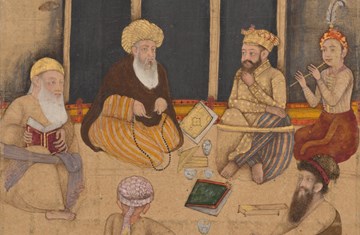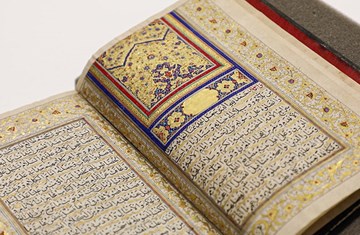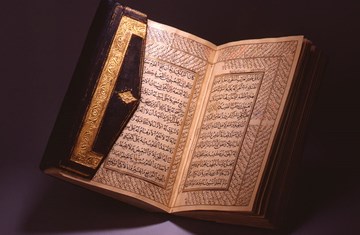Poetry at the Aga Khan Centre and the IIS
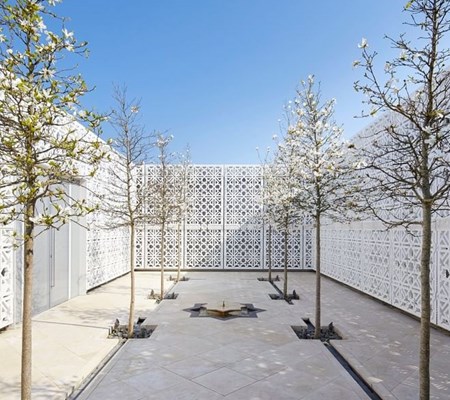
Spring blossoms in the Garden of Light, Aga Khan Centre.
On World Poetry Day, Dr Karim Javan, Research Associate, and Naureen Ali, Cataloguer and Adlib Officer in the IIS’s Ismaili Special Collections Unit, discover poetry in the walls at the AKC, in the manuscripts housed at the IIS, and in today’s Nawruz celebrations.
Today marks World Poetry Day, introduced by UNESCO to celebrate linguistic diversity through poetic expression, honour poets and foster the convergence between poetry and other art forms.
A multiplicity of poetic expressions through different art forms can be found at the Aga Khan Centre (AKC), home to the IIS, in transcriptions and inscriptions of poetry.
Poetry at the AKC
One of the various Islamic Gardens at the AKC, the Garden of Light, is inspired by the Islamic courtyards of Andalusia in Spain, and includes pattered screens with a ribbon of white marble inscribed with verses by different Persian poets, including the following by Nasir Khusraw:
از علم سپر کن که بر حوادث
از علم قویتر سپر نباشد
Make a shield from knowledge
For there is no stronger shield against calamities
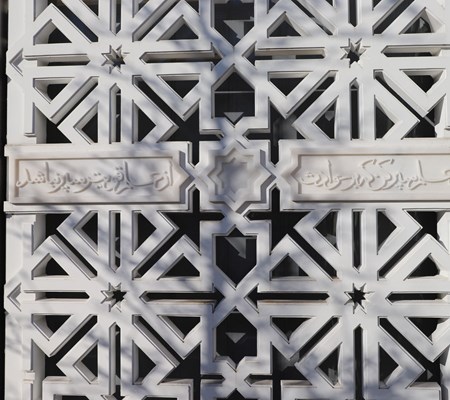
The inscription of the quoted verse by Nasir Khusraw in the Garden of Light. Image credit: Dr N. Nourmamadchoev.
Nasir Khusraw, an Ismaili philosopher, theologian and poet, was born in Qubadyan, Khurasan, in 394 AH/1004 AD. According to the introduction in his Safarnama, at the age of forty, he experienced a spiritual transformation after which he travelled to Fatimid Cairo. He spent four years there and studied Ismaili theology. After being appointed as the ḥujat of Khurasan, he returned to his homeland to propagate Ismaili dawa. He wrote on different subjects of Ismaili theology and philosophy, both in verse and prose.
Poetry in the IIS Special Collections
At the AKC, the IIS also houses its Special Collections, which include the following manuscript of Nasir Khusraw’s Diwan.
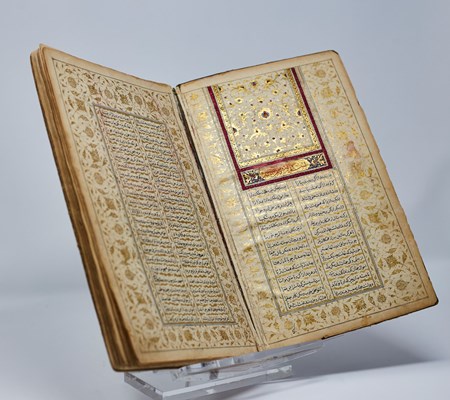
A manuscript of Nasir Khusraw’s Diwan (c. late 18th/early 19th century), part of the IIS Special Collections. Image credit: Rahim Kara.
This manuscript of Diwan-i Nasir-i Khusraw is transcribed in fine black Naskh (a style of Arabic and Persian calligraphy) within multiple rulings and gilded frame. The heading on the first page is illuminated in purple, blue and gold and the first two pages have floral decoration in the margins and between the lines. This Diwan has no colophon so no date and name of the scribe can be identified. Based on the illumination style and the calligraphy, it was produced in Iran in the Qajar period (late 18th/early 19th century).
Poetry and Nawruz
World Poetry Day also coincides with the arrival of Nawruz (a Persian word meaning “new day”), which marks the beginning of Spring and is celebrated as the start of a new year by more than 300 million people around the world.
There are various forms of celebration in different regions such as family feasts, exchange of gifts, children playing with painted eggs, and preparation of a Nawruz table with symbolic objects signifying happiness, fertility and abundance. You can discover more about some of these celebrations and rituals in Dr Shiraz Kabani’s recent book Ismaili Festivals: Stories of Celebration. Along with cultural performances, writing and recitation of poetry is also a common feature of Nawruz celebrations.
Nasir Khusraw’s poetry includes various symbols from nature. All signs of transformation in life and nature for him are inspirations to reflect on his faith and beliefs. On the occasions of Spring and Nawruz, he writes:
بهار دل دوستدار علي
هميشه پر است از نگار علي
دلم زو نگار است و علم اسپرم
چنين واجب آيد بهار علي
The spring in the heart of Ali’s lovers, is always illuminated by his love,
My heart is adorned by him, shielded by knowledge,
Such is ought to be the spring of Ali.
جهان را دگرگونه شد کارو بارش
برو مهربان گشت صورت نگارش
به دیبا بپوشید نوروز رویش
به لولو بشست ابر گرد از عذارش
The world was transformed as its affairs,
And kindly graced by its Curator,
Nawruz put on its silky dress, as clouds washed away dust from its face.
The last line captures the spirit of renewal ushered in by Spring and Nawruz: it is a time to celebrate and look forward to a fresh, new year—with joy and poetry.
An exploration of themes and techniques used by Nasir Khusraw, along with an English translation of some of his poetry, can be found in Make a Shield from Wisdom: Selected Verses from Nasir-i Khusraw’s Divan by Annemarie Schimmel.






